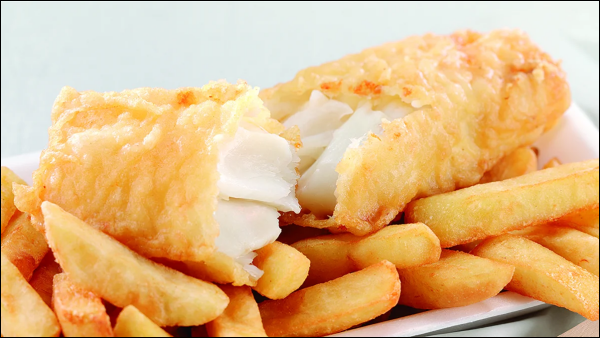There are only three things I can tell you about the great British institution that is Fish & Chips. This is what I learnt when I attended the Kings College London inaugural Impact Reception on 14 Jun 2023. It was a unique evening highlighting six specialisations, and featured three presentations by leading academics. The focus was on “doing some good in the world” and we explored:
• Global Affairs
• Education for Displaced Persons
• Women’s Leadership
And three niche areas of medicine where KCL excels:
• Simulation and Interactive Learning
• Virtual Reality Research Lab
• Surgical & Interventional Engineering Lab
I have never been in a room so full of intelligent people doing good! Later in the evening, when I was chatting with Professor Richard Trembath (Health & Life Sciences) the discussion naturally turned to Fish & Chips.

Fact One
Until the advent of the Chinese Takeaway (at some point in the 1970s) the only enduring fast food outlet was the local Fish & Chip Shop. McDonalds did not arrive in my corner of the UK until 1980, and I do not recall ever having a pizza until one day in London in 1982 when I discovered that there are Pizza Restaurants in London. The same thing goes for kebabs. In London, in 1982, I found a kebab shop (a kebab van to be more accurate). I had never seen one before! Hence the humble Fish & Chip Shop was the standard which all UK kids encountered if they grew up before 1980.
Fact Two
Fish & chips are generally doused in vinegar and smothered in salt. That was standard practice in the 1970s before the government was pressured to legislate about salt and sugar intake. I spent most of my childhood in the Sixties and Seventies eating anything I felt like, regardless of the salt and the sugar content. And I was slim! We were all slim (except for, roughly speaking, one kid in every class). So what happened? Why is the population now so overweight and why is Type 2 Diabetes so prevalent?
Fact Three
In 1970 the overweight/obese proportion of the UK population was about 15%. It is now 64%. Type 2 diabetes more than doubled in British men between the 1970s and the 1990s and it continues to increase. There is a reason for this and it’s not caused by fish & chips. Fish is a natural food, it turns up in your traditional Fish & Chip Shop in its natural, raw state. So do the potatoes. With a focus on “being a miser with time, and being a miser with money” your local chippie will do the minimum preparation necessary to make some batter, slice some chips, fry it all and quickly get it into your hands in exchange for payment. A minimum of fuss and processing. That’s not the case with modern fast food.
Consider . . .
How many calories and additives are there in your traditional fish & chips? And in your Big Mac and large fries?
Moreover, having a take away meal was a rare treat in the 1970s, and the choice was simply between fish & chips and Chinese. Nowadays, vast swathes of the population will gorge processed food as often as they like . . . several times per week! Processed food is the culprit, that’s why the nation is so overweight. Legislation on sugar and salt content does not address the root cause of the problem . . . it’s processed food! And Giles Yeo will tell you more if you care to read his book Why Calories don’t Count.
Nowadays fast food outlets are everywhere, and cycle couriers will do the leg work for you so that you can just sit there and sloth. Poorer people tend to spend a disproportionate amount of their income on cheap fast food. According to Tedstone one third of the country’s fast food outlets are in the most deprived areas of our towns and cities. If you’re in London go and walk around Chelsea, and then walk around Lewisham. Try it in your own home town, walk around the upmarket neighbourhood, and the downmarket one. How common are the cheap fast food places?
What are you doing to ensure that you get some authentic real food on a daily basis, and avoid the gloop?
